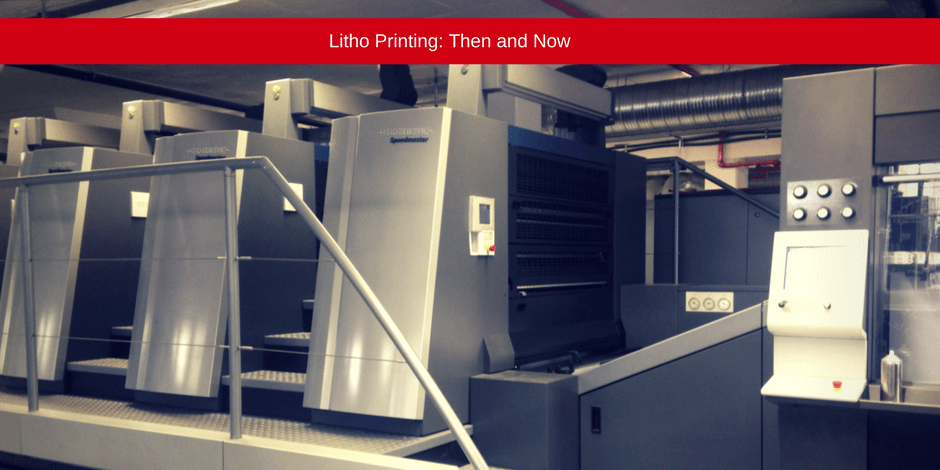A Comprehensive Overview to Comprehending Litho Printing Strategies
The globe of litho printing, a technique originating from the late 18th century, is a fascinating blend of history, art, science and development. Remain with us as we trip into the exciting realm of litho printing.
The Historical Advancement of Litho Printing
The historical trajectory of litho printing, a pivotal technology in the world of communication, is a fascinating tale of human resourcefulness. Birthed in the late 18th century by Alois Senefelder, this strategy was initially an economical method of releasing theatrical works. Lithography, originated from the Greek words for 'rock' and 'to compose', utilized a smooth stone surface to transfer pictures onto paper. The process progressed with the arrival of the rotary press, which substantially boosted productivity (litho printing). In the 20th century, the advancement of countered lithography reinvented the industry, permitting automation of top notch prints. Each stage of litho printing's evolution showcases humanity's relentless quest of performance and high quality in aesthetic interaction.
Decoding the Scientific Research Behind Litho Printing Inks
Progressing in the exploration of litho printing strategies, the focus now moves to the scientific research behind litho printing inks. The composition of these inks, their drying procedure, and color mixing techniques develop the foundation of this intricate art kind. Comprehending these components is crucial to understanding the craft and achieving the desired print outcomes.
Composition of Litho Inks
In lithographic printing, the fundamental role of litho inks can not be overstated. The composition of litho inks varies depending upon its function, but typically, they consist of 2 main elements - pigments and automobiles. Pigments, the color-providing aspects, are finely ground fragments put on hold in the car, a liquid that lugs the pigment onto the printing surface. The car is an intricate blend of resins, solvents, and oils, which affect the ink's drying time, bond, and gloss. In addition, different ingredients are present to enhance certain buildings like flow, drying out, and resistance to ecological results. Each part plays an important part in the last print's quality, making the exact formulation of litho inks a detailed scientific research.
Ink Drying Process
From the make-up of litho inks, attention transforms to the fascinating procedure of ink drying out. The drying procedure is important, as it affects the final print's high quality and longevity. Two key methods are used in litho printing: oxidative drying out and absorption. Oxidative drying out involves the ink responding with oxygen in the air to form a hard, dry film. This technique gives a resilient surface, however can be slower compared to absorption. Absorption, on the various other hand, entails the ink permeating right into the paper fibers, which is a much faster process but can result in less dynamic shades. The choice between these approaches depends on elements such as print speed demands, the paper type used, and the desired finish.
Shade Mixing Methods
While the drying out procedure plays a crucial role in litho printing, the science of color blending techniques holds equivalent importance. The science behind litho printing inks likewise takes into account the openness of the ink, which influences just how shades overlay and mix.
The Art and Design Aspects in Litho Printing
Litho printing breathes life into art and design through its unique elements. Litho printing fits a range of colors, making it possible for artists to develop vivid and dynamic prints. This mix of accuracy and versatility makes litho printing a recommended choice for lots of artists and designers.
Modern Applications of Litho Printing Strategies
Litho printing strategies have actually discovered extensive use in the modern-day industrial field. Its impact and relevance web proceed to grow with the advent of new technologies and innovations in the field. This area will certainly explore these modern applications and the transformative role they play in the printing market.
Business Litho Printing Uses
Litho printing stays an essential part of the commercial sector. High-volume printing tasks, such as the production of publications, newspapers, and product packaging, count on litho printing for its capacity to provide premium image top quality and expense efficiency. Litho printing likewise offers a wide color range, remarkable to that of digital printing.
Innovations in Litho Printing
Pushing the limits of typical strategies, contemporary innovations have actually sustained a host of developments in litho printing. One famous advancement is electronic litho printing, which combines the virtues of electronic modern technology with litho's top quality outcome. These advancements highlight the enduring importance of litho printing in the modern globe.
Discovering the Refine of Litho Printing: Step by Step

Obstacles and Solutions in Contemporary Litho Printing

In spite of the precision and practice that litho printing proudly supports, it is not without its set of contemporary challenges. Digital litho printing permits for cost-effective brief runs and easy customization, attending to the issue of variable information. Hence, while there are obstacles, the litho printing market is proactively adapting to satisfy them head-on, guaranteeing its importance in the future.
Final thought
Finally, litho printing, with its rich history and clinical intricacies, holds a considerable place in the print sector. As the overview discloses, it's a synthesis of art and innovation, with modern-day see this website advancements ensuring its significance. Nonetheless, the market deals with difficulties that need cutting-edge services, with a concentrate on automation and sustainability. The future of litho printing pivots on its ability to adjust to these transforming demands, affirming its enduring worth in a developing market.
